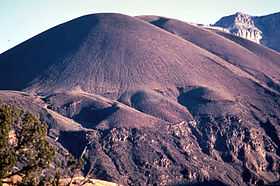Vulcan's Throne
| Vulcan's Throne[1] | |
|---|---|
 | |
| Elevation | 1,555 m (5,102 ft) |
| Location | |
| Location |
Grand Canyon National Park, Mohave County, Arizona, United States |
| Coordinates | 36°13′08″N 113°04′39″W / 36.21889°N 113.07750°W |
| Topo map | USGS Vulcans Throne |
| Geology | |
| Type | cinder cone |
| Age of rock | 73,000 years[2] |
| Wikimedia Commons has media related to Vulcan's Throne. |
Vulcan's Throne is a cinder cone volcano and a prominent landmark on the North Rim of the Grand Canyon in Arizona, United States. Vulcan's Throne, about a mile (1.7 km) west of Toroweap overlook, is part of the Uinkaret volcanic field.[2] The journals of traveler George Corning Fraser record a trip to the summit of Vulcan's Throne in 1914. At the time, the surrounding area was used for sheep grazing, and a small reservoir had been constructed at the base of the volcano.[3] Fraser wrote that
Vulcan's Throne is a pure cinder cone covered with scoriae, cinders, clinkers and peperino lying loose on the surface, with a slope, as near as I could measure, from 28° to 31°. A little sage, many cacti and perhaps some other similar low plants grow on it, but otherwise nothing. Climbing it was like ascending a sand-dune. Every step forward involved slipping half way back and boots were soon filled with painful bits of stone.—George Corning Fraser, 17 July 1914, Journeys in the Canyon Lands of Utah and Arizona, 1914 - 1916, pp 25-26
The cinder cone was formed during the Quaternary Period, and is cut by recent movement on the Toroweap Fault.[4]
See also
References
- ↑ Wood, Charles A.; Jűrgen Kienle (1993). Volcanoes of North America. Cambridge University Press. pp. 277–278. ISBN 0-521-43811-X.
- ↑ 2.0 2.1 "Uinkaret Field". Global Volcanism Program. Smithsonian Institution. Retrieved 2007-05-23.
- ↑ Fraser, George Corning (2005). Frederick H. Swanson, ed. Journeys in the Canyon Lands of Utah and Arizona, 1914 - 1916. University of Arizona Press. p. 25. Retrieved 20 May 2013.
- ↑ "America's Volcanic Past: Arizona". U.S. Geological Survey. Retrieved 20 May 2013.
Vulcan's Throne, a Quaternary cinder cone on the rim of the Canyon is cut by recent fault movement on the Toroweap fault.